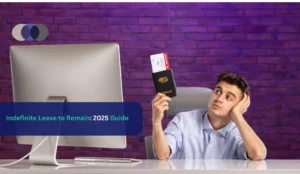Navigating the road to settlement in the UK, also known as Indefinite Leave to Remain (ILR), can feel like a complex puzzle. With shifting rules and plenty of terminology, it is easy to feel overwhelmed. But put simply, ILR is your key to settling permanently, working freely, and building a life in the UK without the stress of visa renewals.
Here is your clear, human-centred walk-through of ILR: what it is, who qualifies, how it works, and how to avoid the pitfalls.
What Is Indefinite Leave to Remain (ILR) in the UK?
ILR, often just referred to as settlement, is the immigration status that removes time limits from your stay in the UK. Once granted, you can work, study, access public funds (if eligible), and eventually apply for citizenship if you choose, all without needing visa renewals, as long as you stay within the rules (gov.uk).
What Are the Requirements for ILR?
While there are different routes, most ILR applications hinge on these core requirements:
- Lawful residence in the UK for a set period (typically 5 or 10 years)
- Limited absences, restrictions on how much time you can spend outside the UK (gov.uk)
- Language and culture knowledge, passing the Life in the UK Test and showing English proficiency (gov.uk)
- Good character, meaning no serious convictions or immigration fraud
- Route-specific financial or relationship criteria, depending on how you came to the UK
When Can I Apply for ILR in the UK?
You can submit an ILR application 28 days before you complete your required residency period:
- Five-year routes (Skilled Worker, Spouse, etc.): apply 28 days before your five-year stay is complete (gov.uk).
- Ten-year-long residence: apply around the point when you reach the full decade of lawful residency (gov.uk).
Timing your application well gives you room to manage documents and avoid gaps in your status.
ILR Residency Requirements – How Long Do You Need to Stay in the UK?
- Five-year routes: You must have spent five continuous years lawfully in the UK, often under visas like Skilled Worker, Health and Care Worker, Scale-up Worker, or Spouse visa (gov.uk).
- Ten-year “long residence” route: Requires ten years of continuous lawful stay, including most visa types (gov.uk).
“Continuous” does not mean you cannot leave the country, but absences must be limited.
Do I Qualify for ILR Residency Criteria in the UK?
You might qualify if:
- You’ve spent five (or ten) years following a qualifying visa path
- You didn’t break absence rules (read on…)
- You can meet the language and Life test requirements
- You have no disqualifying criminal or immigration history
- You satisfy any route-specific criteria, such as income or relationship proofs
ILR Absence Rules – How Many Days Can You Be Outside the UK?
Absences are strictly monitored:
- For most routes, applicants may not be outside the UK for more than 180 days in any rolling 12-month period (gov.uk).
- For the five-year ILR route, applicants must not spend more than 180 days outside the UK in any rolling 12-month period during the qualifying period (gov.uk)
- For applicants applying under the long residence route, absences before 11 April 2024 were allowed up to 184 days each, with a 548-day cap on total absences (gov.uk).
Exceptionally compelling reasons, such as serious illness or emergencies, might be accepted, but they must be thoroughly documented.
ILR English Language Requirements – Which Test Is Accepted in the UK?
Most ILR applicants (aged 18-64) must:
- Pass the Life in the UK Test
- Demonstrate English language competence (B1-level speaking and listening), or hold a degree taught in English (gov.uk)
Exemptions can apply in special cases, such as age or health, so always check the latest Home Office guidance.
Life in the UK Test for ILR – What to Expect & How to Prepare
This quiz-style assessment tests your knowledge of UK values, government structure, history, and daily life. Use the official handbook and online mock tests to prepare. Booking early is wise, especially during busy periods.
Which ILR Application Form to Use – SET(M), SET(O), or Others?
Choosing the right form prevents costly mistakes:
- SET(M) – for most family-related routes (spouse, partner, parent).
This form is used for applications under the FM Appendix Family Visa route, including for spouses, partners, and parents. It does not apply to dependents of Skilled Worker or other work visa holders, who need to use a different ILR application form. - SET(O) – for private life or long residence routes.
Used for work-related routes under the Points-Based System (PBS), including Skilled Worker (formerly Tier 2), Innovator, Investor, or other eligible work categories. It also applies to dependents under these routes. - SET(LR) – Used for the Long Residence route (10 years of lawful residence).
- SET(P) – Used for the Private Life route.
- Other forms exist for refugees, armed forces, etc. Always use the form that matches your route (gov.uk).
ILR Application Fees: How Much Does It Cost?
As of 2025, the standard application fee is £3,029 per person, with biometric data included (gov.uk). Optional fees apply for expedited services:
- Priority service: Approximately £500
- Super-priority service: Around £1,000, for same-day or next-day decisions (gov.uk).
5-Year Route to ILR: Skilled Worker and Spouse Visa Paths
If you have completed five years under the Skilled Worker visa, or as a PBS dependent visa holder (dependants of Skilled Worker or other PBS categories), you may be eligible for ILR. The requirements generally include:
- Lawful and continuous residence
- Meeting salary or relationship criteria
- Passing Life in the UK and language tests
- Staying within absence limits (gov.uk).
It is worth noting that the Spouse visa under the FM Appendix family route is a separate category that can also lead to ILR after five years, but it is not connected to the Skilled Worker route. The rules, particularly the financial requirement, differ for that pathway.
10-Year Route to ILR: Long Residence Requirements
For those applying under long residence, you must have:
- Ten uninterrupted years in the UK under eligible visas
- Stayed within absence restrictions
- Met language and culture test requirements (gov.uk).
ILR Minimum Income Requirement: How Much Do You Need to Earn?
- Skilled Worker: Must meet either the going rate for your job or set salary threshold, often around £41,700 or based on national pay scales in healthcare (gov.uk).
- Spouse Route (FM Appendix Family Visa): This is separate from the Skilled Worker route. Previously, a minimum household income of £18,600 was required for a spouse visa, with additional amounts for dependants. However, as of April 2024, the Home Office has updated the income requirement to £29,000 in total, which now applies to both the spouse and any children. (gov.uk).
- PBS Dependent Visa: Dependants of Skilled Workers do not have a separate minimum income requirement. Their eligibility is tied to the main applicant’s visa status and compliance with Skilled Worker salary rules.
- Long residence: No minimum income requirement.
ILR for Dependants: Spouse, Child, and Family Member Routes
Dependants typically apply alongside the main applicant:
- Children under 18 are managed under the family application; over 18, separate visas may be needed (gov.uk).
- Partners must prove a genuine relationship, a marriage certificate, joint finances, communication logs, etc.
- Each dependent must follow the absence rules individually.
What Happens If Your ILR Application Is Refused: Next Steps & Appeals
If refused, you may:
- Request an administrative review (small fee).
- Reapply, making corrections or providing additional evidence.
- Seek legal advice or consider an appeal if there’s a valid reason.
The key is not to delay. Acting swiftly reduces stress and preserves your legal position.
Final Thoughts
Achieving ILR is a significant step toward life and belonging in the UK. It represents long-term stability and the freedom to fully engage with work, study, and society.
With so many nuances, absences, language tests, and fees, it can feel daunting. But breaking down each section, planning ahead, and keeping everything organised makes it manageable. If you prepare carefully, you can confidently secure that important settlement milestone.
If you need any further guidance, please






